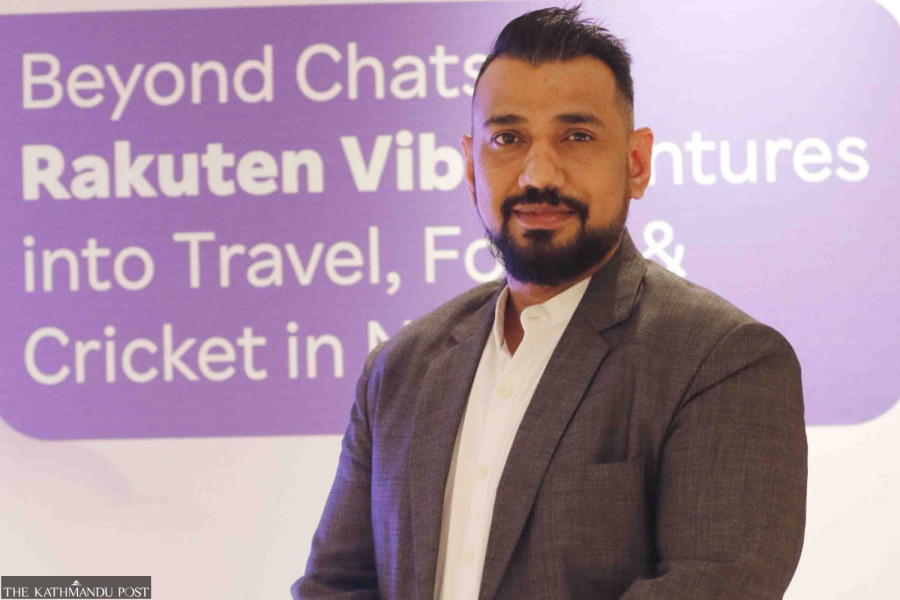Money
‘Data privacy is one of our biggest concerns’
Nitin Tyagi, the business development director of Rakuten Viber for the Southeast Asia region, on the existing performance and future plans of Viber in Nepal.
Subin Adhikari
Nitin Tyagi is the business development director of Rakuten Viber for the Southeast Asia region. Tyagi has more than 12 years of experience in managing the business cycle process from client consultation to identifying opportunities, developing focus and providing tactical business solutions. The Post’s Subin Adhikari caught up with Tyagi to discuss the existing performance and future plans of Viber in Nepal. Excerpts:
Could you describe the journey of Viber in Nepal? What are your future strategies?
Viber is one of the first applications that came to Nepal, and it's really loved by the Nepali people. Over the years, we have seen a phenomenon of growth in the Nepali market. After the 2015 earthquake, Viber was one of the first among all social media applications to allow Nepali users to use its premium service Viber Out for free to make calls all over the world. We have also partnered with several organisations such as the Ministry of Health and Population during the Covid-19 pandemic to disseminate information regarding updates on the number of patients and the availability of beds in hospitals. We have also partnered with the Nepal Police to connect with the public.
Besides, we have a permanent team in Nepal that is working day in and day out with local users to understand their needs. This will give us input to determine our future strategies in terms of features and marketing campaigns.
Is there any new feature that Viber is rolling out for Nepali users?
Viber is the only social media that provides localised content for Nepali users. Over the years, we have rolled out several features and stickers targeting several festivals like Dashain, Tihar and Holi that make communication interesting for users. Besides, we are also expanding in the utility sector. In addition to that, considering the mass movement of the public amid festival season and the hassle of booking bus and airline tickets, we have partnered with local companies that will provide ticket booking services via Viber. We are entering the segments of food, commute, travel and sports in addition to communication services in Nepal. This will position Viber as a super app in addition to just a basic conversation app.
How has Viber been performing in Nepal in terms of user engagement and adoption rates? Are there any unique challenges or opportunities that Viber has encountered in the Nepali market?
In the last couple of years, the calls and messages made via Viber have been growing at an annual rate of 20 percent in Nepal. This is all due to our effort to cater to the needs of users and the bond we have developed with Nepali users with our localised content and features. Now we have set a target to increase the number of active users by 7 percent per month in Nepal. We want to go beyond the number of apps installed in Nepal, we want to see their engagement increase in the app.
A little challenge is good for the growth of the industry. We want Viber and the entire category of communication applications to grow in Nepal. Despite the challenges, we are proud that we trying to localise international campaigns and events and develop purely local content to serve Nepali users.
How does Viber strike a balance between offering free services and generating revenue through its platform in Nepal?
Our core value is that our basic services such as messaging and phone calls will always be free of cost. However, we have certain products that we offer to the business-to-business category that earn us revenue. Public users will never be charged by Viber, only business companies will have to pay Viber.
In an era of heightened concern about user data and privacy, how does Viber prioritise and protect user information?
Data privacy is one of our biggest concerns. We try to take extra precautions to make sure that the user's data is safe. We use end-to-end encryption by default for messaging and call services which not even the employees at Viber can access. We don’t share our user data with third parties like other social applications. In addition to taking extra precautions, we have launched a new feature "Caller ID". Under this feature, whenever a user gets a call from an unknown number, they will be pre-informed whether it’s a spam call or a call from anyone in their connection. We keep on innovating to make sure that all the activities of users on our platform remain safe.
Are there any notable partnerships or collaborations in the pipeline for Viber, particularly in the context of Nepal?
E-sewa is one of our initial partners for digital payment. We have recently partnered with Bus Sewa and Sasto Ticket to provide nearly a million Nepalis who travel during the festive season with ticket booking services at their fingertips via Viber Chatbot. Besides, we have also partnered with Chef Nepal–a home-grown cooking reality show. Using Viber Channel, users can get access to new recipes for the festive season and get to know the contestants well. Besides, we have also launched a feature to provide cricket updates, match prediction and so on of Nepali cricket to Viber users. We have also partnered with several Nepali artists such as Priyanka Karki and Swoopna Suman recently. We want to support local talents on our platform as well.




 21.3°C Kathmandu
21.3°C Kathmandu














